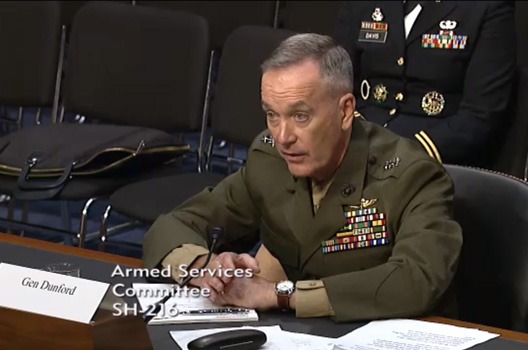 Gen Joseph F. Dunford, Jr., the Commandant of the Marine Corps, testified in front of the Senate Armed Services Committee on July 9 to be the next Chairman of the Joint Chiefs of Staff. He looks likely to be confirmed, and analysis already exists about what kind of job he will do if he assumes the role. While his testimony had many important elements in it, a few in particular stood out.
Gen Joseph F. Dunford, Jr., the Commandant of the Marine Corps, testified in front of the Senate Armed Services Committee on July 9 to be the next Chairman of the Joint Chiefs of Staff. He looks likely to be confirmed, and analysis already exists about what kind of job he will do if he assumes the role. While his testimony had many important elements in it, a few in particular stood out.
Dunford’s worries about state threats. Dunford claimed that Russia proved the greatest threat to the United States because of the “existential” nature of the challenge it poses due to its vast nuclear weapons capabilities. He cited China and North Korea as the next biggest threats to the United States, followed by the Islamic State of Iraq and al-Sham (ISIS). This list is not all that surprising or off base. But it does demonstrate that Dunford still sees states as the biggest competition for the United States and that non-state actors—even ones as vile as ISIS—are not as high on the priority list. However, Dunford mentioned that the 2015 National Military Strategy had it right that “hybrid warfare” will persist in the 21st century and so the United States should “update” its models to deter further aggression. Interestingly, this comment was an implicit admission that the United States may not be ready for a changing security landscape. In order to help, he asked (as most US officials do) that NATO allies increase their “capabilities and capacities.”
Dunford will give frank advice. The fascinating theme of the hearing was how direct Dunford was with his answers to difficult geopolitical and security questions. What was most apparent, though, was how much his opinions differed from the current administration’s foreign policies. First, Dunford said he would recommend the United States send “anti-tank weapons” and other defensive (and essentially lethal) weapons to Ukraine. He advocated for delaying the planned withdrawal in Afghanistan based on ground conditions. He also agreed with Sen. Tim Kaine that it would be “positive” for Congress to debate an Authorization for Use of Military Force (AUMF) for the current war against ISIS. Iran, Dunford believes, will continue to “malign” the Middle East regardless of what happens in the nuclear deal. And while Dunford did defend the need for an Asia rebalance and some other Obama administration foreign initiatives, it is clear that he will not back down from giving his true opinion regardless of what his boss thinks.
Military sexual assault is a high-profile issue. Away from the global landscape, a lot of time was spent discussing the scourge of military sexual assault. Dunford had to answer many questions from Senators like Kirsten Gillibrand and Claire McCaskill about the rising rates of sexual assault in the military and the growing practice of retribution for reporting those crimes. When asked if he would commit to stop this “culture issue,” he said he would work with his team on a detailed “written plan” to end the violence. Ending sexual assault in the military is a vitally important issue, and having it brought up on multiple occasions shows how quickly it has risen as a critical problem to solve.
The entire hearing is worth listening to as topics ranged from nuclear weapons to the lackluster US presence in the Arctic to the need for the Pentagon to innovate. But what we learned is that Dunford will focus on the United States’ state adversaries the most, say what he thinks, and work to fix problems within our own military structure. The coming four years should be interesting.
Alex Ward is an Assistant Director in the Atlantic Council’s Brent Scowcroft Center on International Security.
Image: Gen Joseph F. Dunford, Jr., nominated to be the next Chairman of the Joint Chiefs of Staff, testified at his hearing before the Senate Armed Services Committee July 9.
